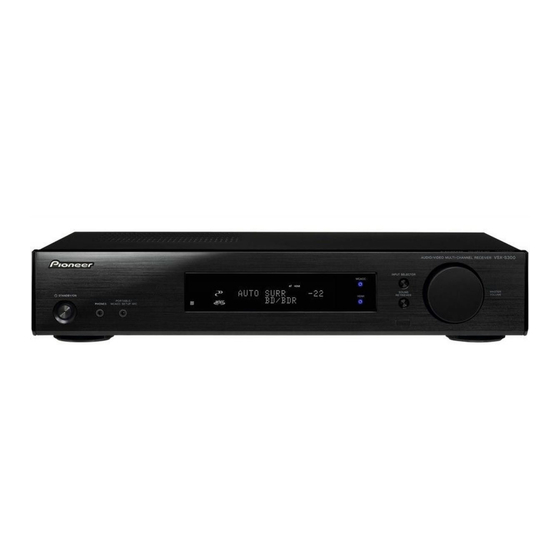Pioneer VSX-S300-k 작동 지침 - 페이지 25
{카테고리_이름} Pioneer VSX-S300-k에 대한 작동 지침을 온라인으로 검색하거나 PDF를 다운로드하세요. Pioneer VSX-S300-k 36 페이지. Audio/video multi-channel receiver
Pioneer VSX-S300-k에 대해서도 마찬가지입니다: 빠른 시작 매뉴얼 (33 페이지)

Listening to your system
Setting/What it does
TREBLE
Adjust the treble level to accentuate or
minimize the bottom end.
b
CH LEV (Channel Level)
Using the channel level settings, you can
adjust the overall balance of your speaker
system, an important factor when setting up a
home theater system.
SB CH (Surround back channel processing)
You can have the receiver automatically use
6.1 or 7.1 decoding for 6.1 encoded sources
(for example, Dolby Digital EX or DTS-ES), or
you can choose to always use 6.1 or 7.1
decoding (for example, with 5.1 encoded
material). With 5.1 encoded sources, a
surround back channel will be generated, but
the material may sound better in the 5.1
format for which it was originally encoded (in
which case, you can simply switch surround
back channel processing off).
When ON is selected, matrix decoding
processing for generating the surround back
component from the surround component is
turned on.
When AUTO is selected, matrix decoding
processing for generating the surround back
component from the surround component is
switched automatically. Matrix decoding
processing is only performed when surround
back channel signals are detected in the input
signals.
When OFF is selected, matrix decoding
processing for generating the surround back
component from the surround component is
turned off.
Option(s)
Setting/What it does
–6 to +6
PHASE CTRL (Phase Control)
Default: 0
Phase Control feature uses phase correction
measures to make sure your sound source
arrives at the listening position in phase,
–15 to +15
preventing unwanted distortion and/or
Default: 0
coloring of the sound.
Phase Control technology provides coherent
sound reproduction through the use of phase
matching for an optimal sound image at your
listening position. The default setting is on
c
ON
and we recommend leaving Phase Control
switched on for all sound sources.
AUTO
EQ (Acoustic Calibration EQ)
OFF
Switches on/off the effect of Acoustic
Calibration EQ.
SOUND DELAY
Some monitors have a slight delay when
showing video, so the soundtrack will be
slightly out of sync with the picture. By adding
a bit of delay, you can adjust the sound to
match the presentation of the video.
SOUND RTRV (Sound Retriever)
When audio data is removed during the
compression process, sound quality often
suffers from an uneven sound image. The
Sound Retriever feature employs new DSP
technology that helps bring CD quality sound
back to compressed 2-channel audio by
restoring sound pressure and smoothing
jagged artifacts left over after compression.
DUAL (Dual monaural)
Specifies how dual mono encoded Dolby
Digital soundtracks should be played.
Option(s)
ON
d
OFF
ON
OFF
0.0 to 9.0
(frames)
1 second = 25
frames (PAL)
Default: 0.0
e
f
OFF
ON
g
CH1 – Channel 1
is heard only
CH2 – Channel 2
is heard only
CH1 CH2 – Both
channels heard
from front
speakers
Setting/What it does
FIXED PCM
This is useful if you find there is a slight delay
before OFF recognizes the PCM signal on a
CD, for instance.
When ON is selected, noise may be output
during playback of non-PCM sources. Please
select another input signal if this is a problem.
DRC (Dynamic Range Control)
Adjusts the level of dynamic range for movie
soundtracks optimized for Dolby Digital, DTS,
Dolby Digital Plus, Dolby TrueHD, DTS-HD
and DTS-HD Master Audio (you may need to
use this feature when listening to surround
sound at low volumes).
LFE ATT (LFE Attenuate)
Some Dolby Digital and DTS audio sources
include ultra-low bass tones. Set the LFE
attenuator as necessary to prevent the ultra-
low bass tones from distorting the sound from
the speakers.
The LFE is not limited when set to 0 dB, which
is the recommended value. When set to –15
dB, the LFE is limited by the respective
degree. When OFF is selected, no sound is
output from the LFE channel.
i
SACD GAIN
Brings out detail in SACDs by maximizing the
dynamic range (during digital processing).
HDMI (HDMI Audio)
Specifies the routing of the HDMI audio signal
out of this receiver (AMP) or through to a TV
(THROUGH). When THROUGH is selected,
no sound is output from this receiver.
j
AUTO DELAY
This feature automatically corrects the audio-
to-video delay between components
connected with an HDMI cable. The audio
delay time is set depending on the operational
status of the display connected with an HDMI
cable. The video delay time is automatically
adjusted according to the audio delay time.
05
05
Option(s)
OFF
ON
h
AUTO
MAX
MID
OFF
0dB
–5dB
–10dB
–15dB
–20dB
OFF
0 (dB)
+6 (dB)
AMP
THROUGH
OFF
ON
25
En
